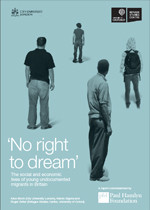Case study: Kirsty
Kirsty, a 22-year-old Zimbabwean, came to the UK nearly nine years ago as an unaccompanied minor – her parents remained in Zimbabwe. She lived with her sister, who has been in the UK for 15 years and who is documented, but after three and a half years she moved out, as they were not getting along, and, without a job, she could not pay for her upkeep. Kirsty feels settled here.
If I get the chance to get my papers… this is like home for me… I love Britain to be quite honest… It’s got so many opportunities for me that I know I can build my life and I know I can be someone tomorrow.
Kirsty completed her GCSEs and gained a diploma in health and social care last year. A boyfriend paid her fees. Aspirations for further education were blocked by her lack of documentation. She has worked as an agency-based care assistant and has had some casual jobs. She used to be a charity volunteer at a centre for refugees and asylum seekers. This provided her with a social life, access to information, and the comfort of meeting others in similar circumstances to her own.
Yet, behind Kirsty’s apparently youthful optimism, she talks frequently about, ‘building my life’. Her situation is complex, very problematic and in a state of flux. She regrets that her sister did not provide more help to get her documented. Both her parents have since died, so she could not settle back in Zimbabwe if she was deported. She is five months pregnant and the child’s father, who has indefinite leave to remain, supports her. She has stopped working. She is currently sleeping on a girlfriend’s floor, having found living by herself unaffordable. She says her accommodation, ‘… is not comfortable [and] is so difficult’. If she tries to pay some rent, she cannot, ‘… afford to buy myself something to eat’. Expressing her anxiety at frequent intervals, her housing situation is a constant source of concern.
… with my situation I really need help and I don’t know how I can get help. I really do feel isolated… I wanted to go to social services [to get rehoused]. I get so scared about asking because they are going to chase you away [because she is undocumented] and to take me home even though there is nobody there.
Although she goes out occasionally with her 25-year-old boyfriend, she describes her social isolation as really boring, being unable to even afford the fare to the social centre. However, her church is an important source of hope and sustenance. ‘It makes me feel so peaceful… I have faith in God… But sometimes… the more [you] pray the more the problems are coming’.
Like so many undocumented young migrants in this study Kirsty lives on the margins, in a social and economic stasis which is interwoven with challenging personal circumstances. She is trapped both by the impossibility of return to her country of origin and by her lack of documentation. This affects her ability to work and access welfare support in the UK, a situation compounded by her family circumstances. Escaping her fear and frustrated dreams, she transfers her hope to her baby… ‘I would love my child to have everything’.
